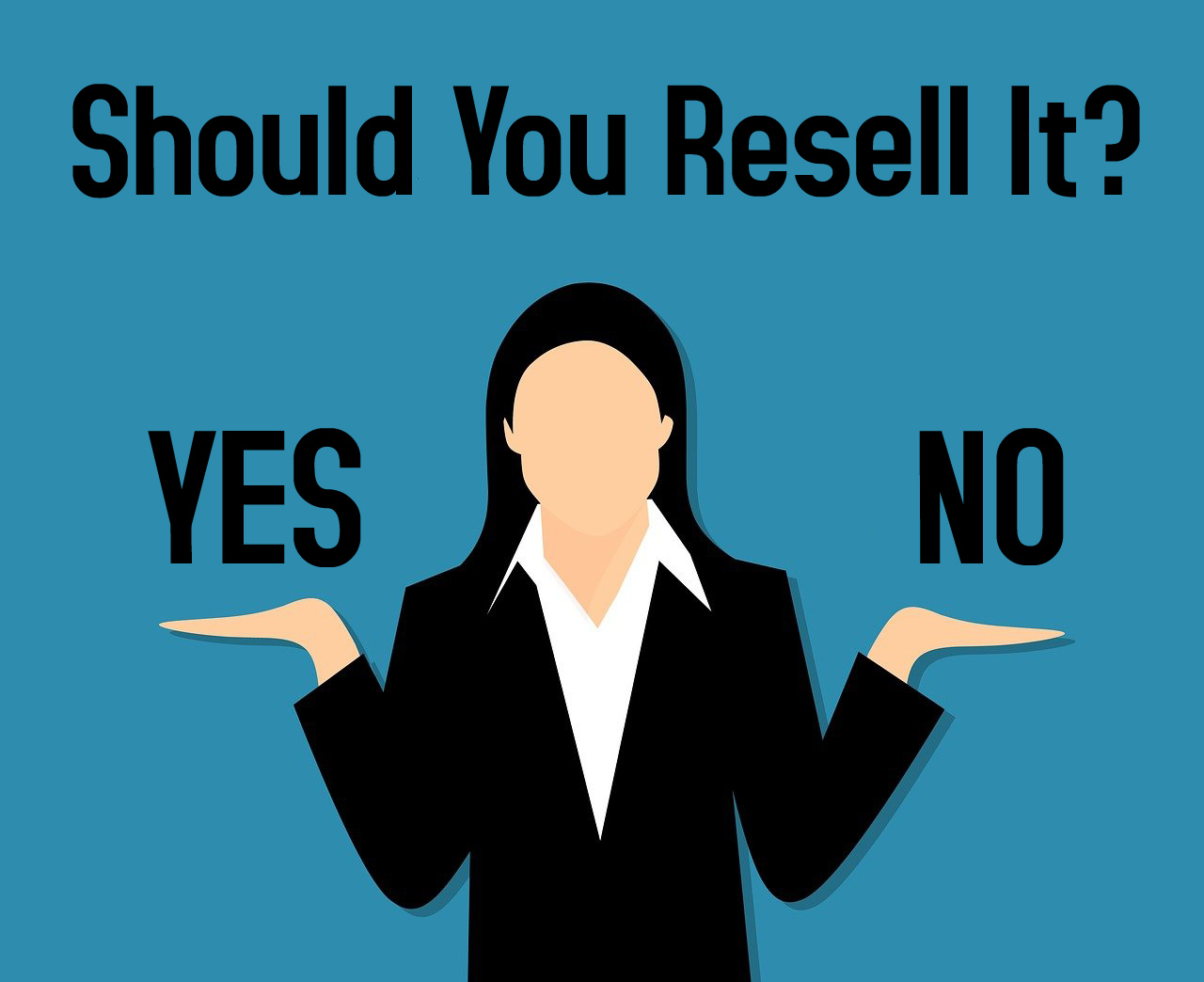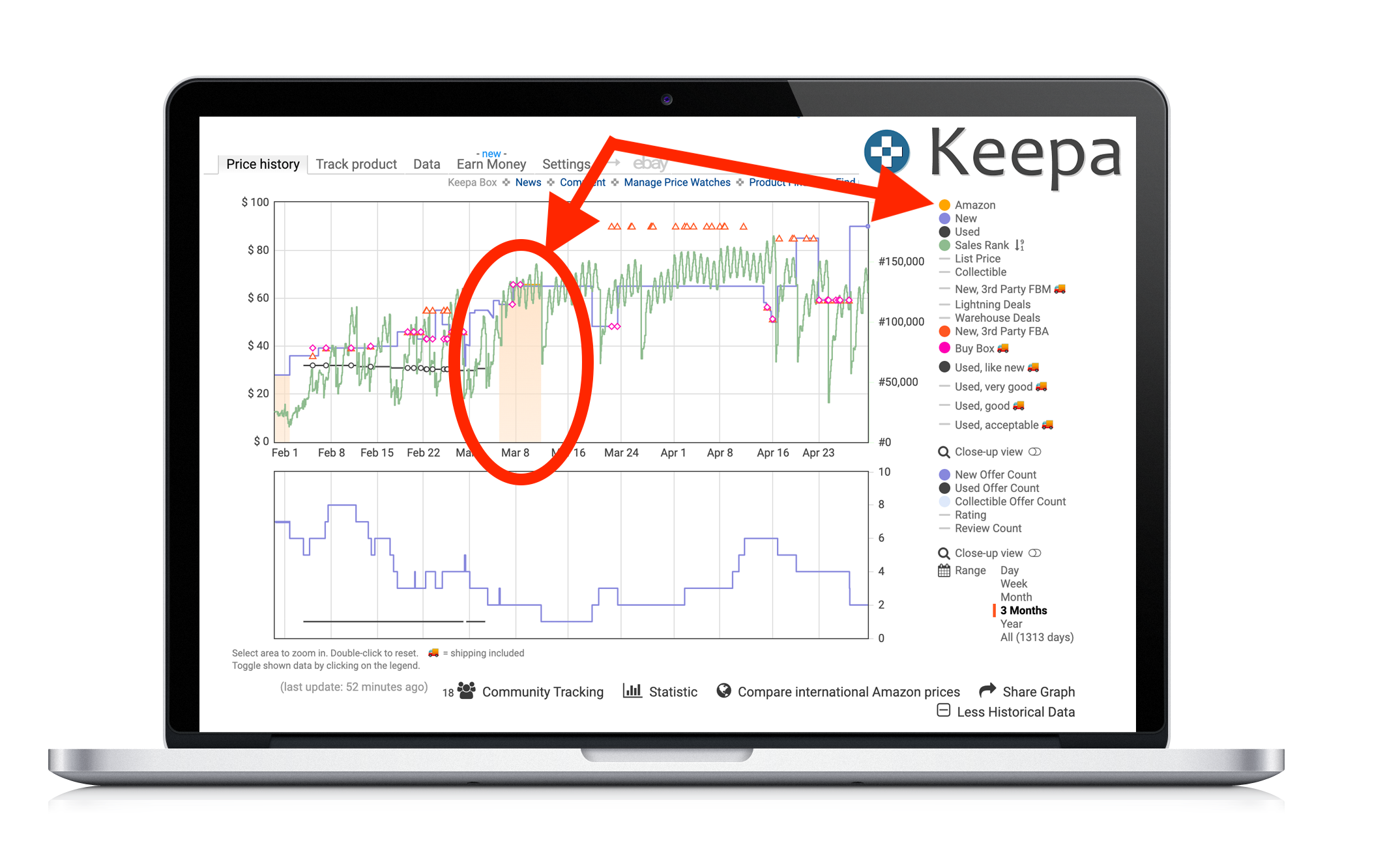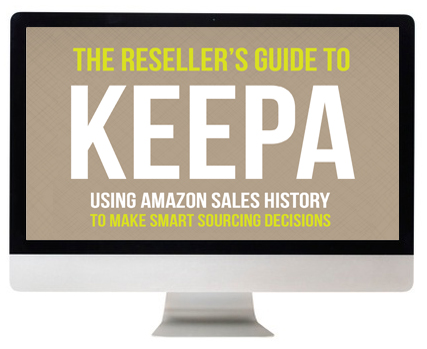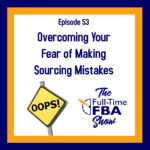Sometimes the fear of making sourcing mistakes will actually lead you to making more sourcing mistakes. In today’s show, Stephen and Rebecca create a slightly different format where we present a few different scenarios that have to do with sourcing and what to do when faced with them. It’s a little game we like to call “Should You Resell It?”
We talk about whether to resell an item with decent sales rank, great ROI, but horrible reviews, and if you should resell an item with mediocre ROI and sales rank if it is the only thing you found on a sourcing mission. Our scenarios also cover whether to resell an item that is not within your usual sourcing comfort zones, and lastly, we dissect the question of reselling an item if it has a sales ranking far higher than what you are used to. Our answers might not be quite what you were expecting, but we have some solid pointers for you to help you feel more confident in your sourcing decision. Tune in today to learn how to improve your sourcing and also to find out some of the other great resources we can offer you on your journey.
Listen on the podcast player below.
Like what you hear? Tell a friend… and be sure to leave us a rating and a review. Here’s how.
Key points from Episode 53:

- Should you resell an item with a decent sales rank, great ROI, but horrible reviews?
- A few situation-dependent examples which can influence a decision one way or another.
- Using Keepa to track the average sales rank of an item before making a decision.
- “Empty cart syndrome” and how it might cause you to make a sourcing mistake.
- Remembering this is a long game and a numbers game: You don’t have to find things to resell everywhere you go.
- Whether to resell items you don’t often sell because they are unfamiliar.
- The importance of getting out of your comfort zone: The more categories you know, the more money you make.
- Whether to sell an item with an unusually high sales rank.
- Using Keepa to research why the sales rank is high before making a decision.
- And more!
Links and resources mentioned in this episode:
 WEBINAR: How to Buy Better, Faster Selling Inventory
WEBINAR: How to Buy Better, Faster Selling Inventory- Keepa – Amazon Price & Sales Rank Tracker
- How to Read and Understand a Keepa Graph
- Going Deep On a Product Buy
- Sales Rank 101
- Overcoming Empty Cart Syndrome
- Expanding Into New Amazon Categories
Right-click here and save as to download this episode to your computer.
 More Episodes from the Full-Time FBA Show podcast:
More Episodes from the Full-Time FBA Show podcast:
Don’t miss an upcoming episode! Subscribe, download episodes, and review the Full-Time FBA Show:
-
-
- Subscribe on iTunes
- Follow on Spotify
- Follow on Amazon Music (or just ask Alexa to “play The Full-Time FBA Show podcast”)
- Follow on iHeartRadio
- Subscribe on Podbean
- Subscribe on Podbay
- Subscribe on Podchaser
-
![]()
 Have you heard about Keepa? It’s a tool (with both a free and a paid plan) that can dramatically lower the risk of sourcing inventory items that end up tanking in price. I’m sure you know how it feels to buy an item expecting it to sell for a high price only to see the price tank soon after you send it to Amazon. With using Keepa the right way, you can protect yourself from that happening!
Have you heard about Keepa? It’s a tool (with both a free and a paid plan) that can dramatically lower the risk of sourcing inventory items that end up tanking in price. I’m sure you know how it feels to buy an item expecting it to sell for a high price only to see the price tank soon after you send it to Amazon. With using Keepa the right way, you can protect yourself from that happening!
Basically, Keepa tracks the vital data on almost every item on Amazon. It can quickly show me the sales rank history, pricing history, buy box price history, used item history, Amazon in stock history, competitors’ stock levels, and so much more. With Keepa, I can easily look at the data from the past and better know what to expect in the future when it comes to price and sales velocity.
 To find out everything there is to know about using Keepa to make smart sourcing decisions, be sure to check out our course, The Reseller’s Guide to Keepa: Using Amazon Sales History to Make Smart Sourcing Decisions.
To find out everything there is to know about using Keepa to make smart sourcing decisions, be sure to check out our course, The Reseller’s Guide to Keepa: Using Amazon Sales History to Make Smart Sourcing Decisions.
With this course, you’ll make more confident sourcing decisions, better pricing decisions, and you’ll grow your Amazon business to the next level by selling your inventory faster and at higher prices!
![]()
Back to the main page for The Full-Time FBA Show
![]()
Episode 53 Transcript:

[0:00:00.5] STEPHEN: If you missed last week’s show, we announced that in October, we are doing a series on overcoming your Amazon FBA fears and we’re going to have some fun, spooky music with the introduction and throughout the show so just want to let you know we’re doing something a little bit different this month as we discuss overcoming your Amazon FBA fears. Let’s get into the intro music with the fun, spooky music.
[INTRODUCTION]
[0:00:23.5] ANNOUNCER: Welcome to The Full-Time FBA Show. In each episode, it’s our goal to help you turn part time hours into a full-time income, selling almost anything on Amazon. Now, your host of the show, Stephen and Rebecca Smotherman.
[INTERVIEW]
[0:00:41.8] REBECCA: I love that spooky music, it’s so fun and I am glad you’re here with us. Today, we are in the middle of our fear series on the full-time FBA show. Today, we’re going to be talking about overcoming your fear of making sourcing mistakes. This is a big one, I know this is one that had me paralyzed at times at the beginning of my career in selling via FBA and I am really excited to talk to Stephen today about these different fears of making sourcing mistakes. On that note, I want to welcome Stephen to the show, my cohost.
[0:01:15.4] STEPHEN: Hey Rebecca, I’m glad to be here today talking about these fears and how people can overcome them because when they overcome these fears, they can be able to find more inventory to sell, make better decisions and be more successful.
[0:01:28.0] REBECCA: That’s what we all want is to be more successful on their Amazon FBA business.
[0:01:32.4] STEPHEN: Yes.
[0:01:37.8] REBECCA: Okay, we have something a little bit different today.
[0:01:40.9] STEPHEN: Besides the music. Well, yes. Besides the music, that is one difference if you’re taking notes on the differences in our show. I guess we have two differences, the other difference is going to be kind of the format of this next part of the show. I’m going to give you some situations Stephen, we’re going to call this “should you resell it?” I’m going to give you a situation and it’s going to be a scenario of making a decision about whether or not to purchase an item because we’re talking about overcoming your fear of sourcing mistakes.
I’m going to give you a scenario of whether or not you should buy an item, is this a good purchasing decision or not, I’m going to ask you, should you resell it and then I want you to kind of pick apart that item and the particular scenario and tell us what your thought process was on the decision you make?
[0:02:31.0] REBECCA: Sounds good. Okay, our first one, should you resell it? You find an item and it has a decent sales rank, there’s a great ROI so your return on investment’s going to be really good but you see that the item gets really bad reviews, it’s just horrible. Nobody that’s reviewed this item likes it. The situation is decent sales rank, great ROI, horrible reviews, should you resell this item?
[0:03:02.7] STEPHEN: This is a really good question and it’s something that I have struggled with from time to time and I understand basically, there’s two fears in this type of situation. Number one, you fear the customer’s going to return it, they don’t like it, it’s a horrible product, they’re going to return it and you don’t want to deal with a return. Another fear is you fear negative feedback, you know? The item might be bad, they might not end up returning it but they still might want to come after you and giver you a negative review because you’re selling such a horrible product.
When you are thinking from that perspective, then it seems like it’s an obvious no. You should not resell it. But, maybe if you dig a little bit deeper you can find out some information that will help you see that it actually is a good thing to resell. Again, you were saying it has a decent sales rank, I want to get a little bit more information about that sales rank, I want to see what the average sales rank is over a long period of time and I use a tool called Keepa, I talk about it almost every week on the show.
It’s a tool that tracks pricing and sales rank history.
[0:04:01.2] REBECCA: The reason you talk about it every week is because it’s that important to being able to make good decisions for buying.
[0:04:06.9] STEPHEN: Absolutely, I couldn’t make my decisions without Keepa and when I use Keepa, it will help me make a decision on this. If I see that an item has horrible reviews, I want to see what the average sales rank is over long period of time. If the average sales rank is good, it’s in my safety parameters, my sourcing parameters then I will still purchase that item because I can expect it to sell even though it has horrible reviews.
One of the reasons why is because I know that more people leave negative reviews than positive reviews, more people complain than they do compliment. Even if an item has a really horrible reviews, I still don’t let that bother me. Now, the only time I do completely avoid buying an item that has horrible reviews that I could potentially get returned is a really high-priced item.
If it is a really high priced item then I don’t want to have to deal with having those items returned because a lot of the times, if it’s a new item an they open it up and then they leave a horrible review and they decide to return it, I might not be able to sell it again in new condition and so if it’s a really high priced item, I might walk away.
But if it’s an average priced item, low priced item, I don’t worry about that, I don’t worry about a negative review either because if the customer is reviewing me and leaves a review that’s for the product, that’s actually against Amazon’s feedback guidelines.
[0:05:26.6] REBECCA: You’re talking about feedback?
[0:05:27.1] STEPHEN: Yeah, review. I’m used reviewing feedback interchangeably. If someone gives me a negative seller feedback but just complains about the product, Amazon will usually strike that through and if they don’t do it, you can open up a case with Amazon and ask them to investigate that and most of the time Amazon will remove that feedback. Especially if it’s a 100% product review in the place of a seller feedback.
I don’t really worry about returns and I don’t worry about negative feedback because I can get those removed. If the item is selling consistently and it’s especially if it has a great ROI, I’m going to go ahead and resell it and time and time again, I have not been disappointed with my decision to buy an item that has horrible reviews.
[0:06:11.2] REBECCA: Can I add kind of an addendum to that though?
[0:06:13.7] STEPHEN: Absolutely.
[0:06:14.5] REBECCA: Because I sell shoes and I think that shoes are going to – you find out information in the reviews of shoes that are going to be different from the reviews of toys or household items or other categories where when I’m looking to buy shoes, I do look at those reviews and if it is decent sales rank, great ROI but not great reviews, that does influence my decision a little bit more probably than it does you’re selling in other categories.
Because of the return rate of shoes in general, and because I don’t want to be sending in a pair of shoes the FBA that I know based on the reviews and the – as the fits as expected person in all of that that I’m just asking for a return.
[0:07:00.3] STEPHEN: Yeah, that’s a really good point to make on that.
[0:07:03.1] REBECCA: Okay, but in general, you’re looking more at the sales rank than you are at the reviews to make your decision on that.
[0:07:10.6] STEPHEN: Absolutely.
[0:07:11.9] REBECCA: Okay, to answer the question, should you resell it, you would say yes and I would say no. It depends on the category.
[0:07:19.2] STEPHEN: Right, it depends on what your comfort levels are and so you know what? Just try some things out, test the waters and see how you feel, don’t go all in on a particular item that has horrible reviews but test it out and see what you think.
[0:07:32.3] REBECCA: Okay, that was our first one, our second one, should you resell it – let’s say that you’re outsourcing, you’re doing retail arbitrage here. Or this could also apply if you’re doing online arbitrage because I’ve had the same experience, I don’t do RA, anybody that’s listened to the show or read our blog for any amount of time knows that I am not a big fan of RA because I just would prefer at home, Stephen loves it, I’m more of an OA person, let’s say you spend half an hour in a store or you spend half an hour on a website and you can’t really find anything good to resell.
But then, right as you’re about to leave, you’re just at your breaking point, and you’re kind of walking out, you see an item, check it, it has an okay rank. And it has decent ROI. Not great, just okay, just decent and you’re really thinking, I just spent all this time in here and I just don’t want to leave the store empty handed or I don’t want to abandon this website without putting anything in my online cart.
You found this one item and it’s okay, it’s okay rank, it’s decent ROI. Should you resell it?
[0:08:41.4] STEPHEN: Good question. It’s totally true, the empty cart syndrome is real, sometimes it just – we hate the idea of having an empty cart or leaving a store with an empty cart, we think about the time we wasted or we start thinking about maybe I’m the problem and I’m not able to – and maybe the problem is with me but when we decide to buy something that isn’t in our normal sourcing parameters just because we don’t want to have an empty cart.
Well that could just potentially start a domino effect of really bad things that could happen with our Amazon business. We could buy inventory that ends up wasting us money and capital with storage fees, we might end up actually having to lower our price and lose money so we could be throwing money away and so, don’t let that fear of an empty cart cause you to make bad sourcing decisions.
[0:09:32.2] REBECCA: I want to add to that as well, it also can cost you time because not only are you losing potentially losing out on storage fees and inbound shipping and all the other things that are involved with sending an inventory that’s sub-par according to your normal souring parameters. But you’re also taking the time to prep that item, ship it, and then, see it, the mental burden of seeing it in your inventory, just languishing there, you know, the price is not going up and the sales rank is going up and you’re having to spend mental energy deciding what do I do with that item.
When, if you just walked away from it,, you would just be able to make a better decision on another item and another store and not spend that mental energy for weeks and months down the road, you know, the gift that keeps on giving as far as a bad decision like that.
[0:10:26.0] STEPHEN: Right. I know a lot of us, we hate wasting time but you know what? If you spend half an hour in a store and you don’t find anything that you can buy, it doesn’t mean you’ve wasted time, it means you’ve just had a short run of bad luck and so, we need to remember, when we’re running this Amazon business that first off, it’s a business and second off, we’re playing the long game, sometimes we’re going to hit a homerun, sometimes we’re going to strike out and sometimes we’ll have a bad day, sometimes we’ll have a great day.
It all evens out and we can learn from our mistakes and we can think back to when we have purchased an item to avoid an empty cart and how bad that went so that we can make better decisions in the future.
[0:11:03.5] REBECCA: Yeah, I would say too, I don’t even consider that really just bad luck. I mean, it’s a long game that we’re playing but it’s also a numbers game, you know, you have to scan a lot of items before you find the ones that fit best in your business.
You might have seen videos or heard people talking about as resellers like I can go into any store and find anything in there to resell and maybe, but you know, their business model might be different from yours and they may be lying. Who knows? But you don’t’ have to find something everywhere you go it is a numbers game, it might take you a lot of scanning or a lot of clicking before you find something that works for your business and that’s okay, that’s the way it works and that’s why your business is going to be profitable compared to other people who are just looking for that low hanging fruit and when they don’t find it, get discouraged and quit.
[0:11:52.7] STEPHEN: Yeah, absolutely.
[0:11:53.7] REBECCA: Okay, so should you resell it just to get out of the store without an empty cart consensus is –
[0:12:01.2] STEPHEN: No, no, no, no.
[0:12:02.5] REBECCA: Don’t do that. You should not resell that okay decent item. All right, so the next situation we’ve got here, let’s say that you as an Amazon reseller love to source books and you also source toys those are you big niches on Amazon and you’re really good at it but one day you are out looking for your normal items and you see some other items that are in a category you have never sold in. There is a clearance in cap at a store and it’s got some items on it that you have never really considered before.
But suddenly, you find yourself thinking, “I don’t know, let’s check these out.” We’ve got diapers, alarm clocks, some grocery items. You are a toy and book reseller, should you resell those items?
[0:12:50.5] STEPHEN: Well, obviously we can’t just say yes or no here. It always depends on the situation but before we even get into should we resell those, we want to think of the mental side of everything. You know all sellers have comfort zones. Comfort zones of what we are used to, what we have practice in but if we stay in our comfort zones, you know we miss out on profitable opportunities all around us and so it’s always a good idea to expand your comfort zones.
Expand into new categories because the more categories that you learn selling on Amazon, the more comfortable you become and the more profitable you become and so after you first make sure that your approved to sell in that particular category, you can expand and slowly you know maybe add one category at a time and you might find a profitable niche that ends up being something that you really enjoy sourcing.
I know for me, I started in books and toys and I am mostly focused on those but then I started to expand into the home and kitchen category and I love the home and kitchen category and I never would have gotten there if I didn’t get out of my comfort zones and try it a little bit and I know the same is true for you with shoes Rebecca with getting out of your comfort zone and learning how to do shoes.
[0:13:59.1] REBECCA: Yeah, I know that was definitely the case for me when I got into shoes that I came from a background of primarily looking at books and some toys but Stephen is more of the toy guy in our business but I was really into selling books and yeah, kept hearing about how great shoes were and so just decided I am going to try it out. I am going to spend some time learning how to do it and one thing led to another and that’s my main niche right now.
So yeah, you just really never know until you do branch out of that comfort zone. I will say, that when we say expand your comfort zone we are not talking about day one as an Amazon reseller even day 20 as an Amazon reseller. Try everything, you know it is really good to focus on one thing until you know it well but then once you know it well and you’ve got some solid footing on Amazon in general or in a category in particular that’s when it really is good to start branching out of that comfort zone.
If you are making some profits, you have a good idea of what you’re doing and you are just looking for a way to try something new and maybe spruce up your inventory, diversify a little bit that’s when I think that it is a good idea to say, “You know what? I think I can handle this. I really need to get over my fear of I don’t understand grocery,” you can understand grocery.
[0:15:18.0] STEPHEN: Yeah, you can learn it. There is ways that you can learn every category, gain some experience and get some new comfort zones, new categories added to your comfort zones.
[0:15:26.2] REBECCA: So the answer to that one is should you resell it?
[0:15:30.4] STEPHEN: You should give it a shot. You should try it out, slowly work your way into a new category and if it fits your sourcing parameters and that is also part of the learning process, learning your new sourcing parameters for that particular category but try it out and if it works for you then yeah, go for it but if it doesn’t, pass.
[0:15:48.5] REBECCA: All right, so we have one more situation here. You have found an item in the toy section of a store. It has an amazing ROI, great profits on this item if it sells at this price but the sales rank that you are currently looking at is really high like way out of your toy sales rank parameters way beyond what you normally do. So you are looking at it and you are thinking, “I could really make some good money on that item but I’ve never purchased a toy without having the sales rank before. I don’t know what to do, it is hard to walk away from something that’s that profitable” do you resell it?
[0:16:28.6] STEPHEN: Well, you may be starting to notice the trend. You know there is the answer, it depends for each situation.
[0:16:34.1] REBECCA: I know we always love hearing that answer. “No, I want a yes or a no,” it depends.
[0:16:39.5] STEPHEN: Yes, if we gave you a yes or no we would definitely not be serving you well with the knowledge that we have. You know there is two main times when I will source an inventory item that has a super high sales rank. The first one is when the sales rank is artificially high. That is when our friend Keepa comes to the rescue again. Again, you can find out more about Keepa at fulltimefba.com/keepa but Keepa tracks every sales rank and pricing history for almost every item on Amazon.
And you can look and see the sales rank history. Now the pricing history is part of their free program. The sales rank history is part of their paid subscription base but again, it is something that I would not run my Amazon business without that subscription and so when I am looking at the sales rank history, I can see when the sales are happening and what the sales ranks usually are when the item is selling and so maybe the sales rank is artificially high.
And one of the main reasons it might be artificially high is because it is priced too high and so you might be looking at the sales rank history and the pricing history and see, “Oh this item sells all the time at a lower price. I can check and see if that lower price still gives me an ROI.” Here is an example, I remember one time I was out sourcing, I found a Who Wants to Be a Millionaire electronic handheld toy that I could buy for $10 and I could sell it, it was currently priced at around $100 on Amazon.
And it had a 1.2 million sales rank. Now that is way out of my comfort zone. My comfort zone for toys right now might be a 150,000 in the toys and games category and so if I saw it at 1.2 million, I was like, “No way” but then I looked at the Keepa graph and it said that the item sells pretty consistently when it is priced around $50 and so I can see that the reason why the sales rank is so high is because all of the prices of the competitors were too high.
And so I could sell it for $50, still make an ROI on my $10 investment and could be able to purchase that item with a high sales rank because Keepa told me the whole story. The second time when I like to buy items that have a super high sales rank is when an item is out of stock on Amazon. Again, sales ranks happen because of sales and if there is an item that is out of stock on Amazon, the sales rank is only going to get higher and higher.
And so I again, look at the Keepa graph. I can see what the prices usually the item sells for. I can look at the sales rank consistency during that price and I can make a good decision to buy an item that has the highest sales rank right now. The cool thing about buying items that have no completion is you get to pick your own price and so you can start on the average price that it sold for in the past and you could see and slowly lower your price overtime to get that next sale knowing that there is no competition.
But again, when I find items that have a high sales rank, it is because it is artificially high or because the items is out of stock then I’d do a little bit more digging and find opportunities to be able to find that item to buy it and sell it for a profit on Amazon.
[0:19:38.5] REBECCA: All right, so again as on some of these other situations, the answer to this last scenario, would you resell it is it depends, use Keepa.
[0:19:47.9] STEPHEN: Yes, use Keepa and if you have been listening to us talk about Keepa and you’re like, “How does that work?” we have a free training video for you, fulltimefba.com/readkeepa and we will walk you through how to use Keepa.
[0:20:00.3] REBECCA: Yeah that is my main takeaway on all of this is should you resell it, it depends. Do your research, use Keepa.
[0:20:06.9] STEPHEN: Yes and if you are really interested in learning more about Keepa and how it can help you make better buying decisions, we have a webinar for you that is coming up. If you are listening to this on the day this drops, the webinar is tomorrow so sign up now and if you are listening to this after the webinar drops a few days after, then we’ll have the replay for you and you can find both to sign up form and the webinar replay at this same link, fulltimefba.com/betterinventorywebinar.
We’ll show you how to use Keepa to source better inventory that sells faster and at the higher prices that you expect them to sell for.
[0:20:38.0] REBECCA: All right, well this was a fun little diversion from our normal format. I think I am going to vote that we do something like this again in the future.
[0:20:45.2] STEPHEN: That will be fun.
[0:20:45.8] REBECCA: So we’ll come up with some more scenarios for a future episode and play the little should you resell again and as Stephen was saying, all of the shownotes you can find the links and the shownotes for this episode at fulltimefba.com/53, the number 53 because this is episode number 53 of The Full-Time FBA Show. All of the links that we’ve mentioned including the link for that webinar, including the link for a video about how to use Keepa free tutorial that will be in the shownotes. So please check that out at fulltimefba.com/53.
[CLOSING CONVERSATION]
[0:21:25.7] REBECCA: All right, one last thing I wanted to share with you today, we love when we get reviews for the podcast either on the Apple Podcast app or wherever you’re listening to your podcast and we wanted to share one with you today that is very encouraging to us. “I love it, it is a great podcast.” It comes from Shellimoowho.
[0:21:46.4] STEPHEN: Shellimoowho, that’s fun.
[0:21:49.0] REBECCA: I love that. So Shellimoowho says, “A great podcast for Amazon FBA seller, gives actionable easy to understand advice for those setting up and running an FBA business. Stephen and Rebecca are knowledgeable and bring a wealth of information. It is nice to hear their stories of how they started and to hear from other FBA sellers as well. The podcast is well-produced and is an easy listen.” And we really appreciate that feedback.
And we would love it if you would leave us a review as well. This helps other listeners to be able to find our podcast so that we can help them to grow their Amazon FBA business and find success.
[0:22:24.9] STEPHEN: Next week on the podcast, we are going to be continuing our fear series. We are going to be talking about overcoming your fear of hiring help. When we sent out a poll this is one of the top responses, people were scared of hiring help. “How do I hire them? How do I train them? What if I am training my competition?” lots of stuff we are going to talk about in the next episode when we are going to just tackle the fears of people when they have the desire to hire some help in their Amazon business but they don’t know what to do or how to do it the right way.
So we’ll talk about that in the next episode of The Full-Time FBA Show. Thanks and have a great day.
[OUTRO]
[0:22:57.2] ANNOUNCER: That is all for this episode of The Full-Time FBA Show. So head over to fulltimefba.com/podcast, where you will find the shownotes and links from this episode. While you’re there, subscribe to our newsletter where you’ll get several free downloads of our popular and helpful Amazon FBA resources including a free e-Book. Now, take action on what you have learned today so you can find success at turning part-time hours into a full-time income with Amazon FBA.
[END]

Leave a Reply